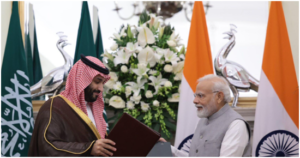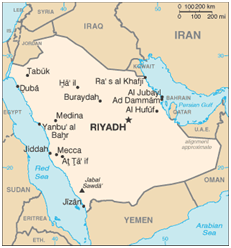Not Just Oil
New momentum in ties between India and Saudi Arabia could be game changer
Relevance
- GS Paper 2 Bilateral, regional and global groupings and agreements involving India and/or affecting India’s interests.
- Effect of policies and politics of developed and developing countries on India’s interests, Indian diaspora.
- Tags: #SaudiArabia #oil #G20 #India #currentaffairs #upsc.
Why in the News?
Recently Crown Prince Muhammad bin Salman’s (MBS) had a state visit to India, in conjunction with the G20 Summit in New Delhi.
Over the past decade, India’s foreign relations have experienced a significant boost, especially in its engagement with the Middle East. Among these relationships, the one that has seen remarkable growth is with the Kingdom of Saudi Arabia.
Strengthening Ties in the Middle East
- Crown Prince Muhammad bin Salman’s (MBS) recent state visit to India, in conjunction with the G20 Summit in New Delhi, underscores the burgeoning ties between the two nations.
- Notably, the proposed India-Middle East-European Corridor (IMEC) aims to create vital port-railroad connectivity, positioning India and Saudi Arabia as pivotal players. MBS’s second state visit in four years has added a unique dimension to their bilateral relations.
Expanding Horizons: Key Agreements and Collaborations
- Following the G20 Summit, the India-Saudi bilateral meeting resulted in the signing of eight significant Memorandums of Understanding (MoUs).
- These MoUs cover areas such as vigilance, financial regulation, exim banks, and desalination technology.
- Additionally, various minor understandings span IT, petrochemicals, pharmaceuticals, “clean” energy technology, manufacturing, and defense. The burgeoning trade relationship, with India as Saudi Arabia’s second-largest trading partner and vice versa, reached $52.75 billion in the 2022-23 fiscal year.
Energy Security and Saudi Investments
- Saudi Arabia’s status as India’s primary source of crude imports for nearly a decade highlights the importance of energy in their relations. The roots of India’s reliance on Saudi oil date back to the 1960s.
- However, historical circumstances, including the decline in Iraqi exports and sanctions on Iranian oil, led India to increase its imports of Saudi crude.
- Riyadh capitalized on this by investing in refinery technology suitable for Gulf-side crude. Furthermore, commitments to invest $50 billion in a new refinery on the Maharashtra coast and a petrochemical plant, though stalled due to land acquisition issues, demonstrate Saudi Arabia’s dedication to this sector.
Economic Collaboration Beyond Energy
- Beyond energy and petrochemicals, MBS announced a substantial investment of $50 billion, including the establishment of a Saudi Sovereign Wealth Fund office in Gujarat International Fin Tech-City.
- This diversification of investments showcases the growing economic collaboration between the two nations.
Humanitarian Cooperation and Regional Influence
- Saudi Arabia’s role in aiding Indian expatriates in Port Sudan reflects the deepening humanitarian cooperation between the countries.
- MBS acknowledged the significant contribution of Indian expatriates to the Kingdom, signalling a shift away from the days when India’s relations with Saudi Arabia were hampered by Islamabad.
A Transformative Partnership: IMEC and Saudi Arabia 2030
- The prospective collaboration on the IMEC port and railroad corridor could integrate India and Saudi Arabia into the global supply chain in a manner not witnessed since the Portuguese sea route to India in the 15th century.
- Additionally, India’s support for Saudi Arabia’s inclusion as a permanent member of BRICS aligns with MBS’s vision of a post-oil economy under Saudi Arabia 2030.
Sustainable Prosperity and Future Prospects
- Saudi investments offer India a more stable form of foreign capital, less susceptible to abrupt market fluctuations.
- Furthermore, addressing India’s energy security concerns forms a substantial component of this relationship. The mutual benefits derived from this growing bonhomie are likely to endure over the medium term.
In summary, India’s relationship with Saudi Arabia has experienced significant growth in the past decade, with a focus on economic diversification, energy security, humanitarian cooperation, and regional influence. The potential of the IMEC corridor and Saudi Arabia 2030 vision further solidifies their partnership, promising a bright future for these two pivotal nations. As the saying goes, “we ain’t seen nothin’ yet.”
| India’s Relations with Saudi Arabia: A Snapshot
Oil and Gas Partnership · Saudi Arabia is India’s second-largest supplier of crude oil, though Iraq has held the top position. · India imports over 18% of its crude oil from Saudi Arabia and relies on the country for a significant portion of its Liquefied Petroleum Gas (LPG) imports. Bilateral Trade Strength · Saudi Arabia ranks as India’s fourth-largest trade partner, trailing behind the USA, China, and the UAE. · Bilateral trade between the two countries in FY22 reached a substantial USD 29.28 billion, encompassing significant imports and exports. Cultural Bonds · Cultural ties are evident through the annual Hajj pilgrimage, with ongoing efforts to digitize and streamline the Hajj processes. · India was honored as the ‘Guest of Honour’ at the Saudi National Festival of Heritage and Culture in 2018, highlighting the cultural exchange between the two nations. Naval Collaboration · In 2021, India and Saudi Arabia launched their inaugural naval joint exercise, named the Al-Mohed Al-Hindi Exercise, signifying growing military cooperation. Indian Community Impact · Saudi Arabia hosts a thriving Indian expatriate community of approximately 2.6 million individuals, making it the Kingdom’s largest expatriate group. · This community is widely respected for its significant contributions to Saudi Arabia’s development and growth. India-Saudi Strategic Partnership Council (SPC) The SPC is a high-level mechanism established between India and Saudi Arabia in 2019, to guide and enhance their bilateral relationship. It consists of two sub-committees: 1. Committee on Political, Security, Social, and Cultural Cooperation. 2. Committee on Economy and Investments. |
Sources: Indian Express
Mains Question
“In the context of India’s evolving foreign relations and regional partnerships, critically analyze the impact of the growing economic and strategic ties between India and Saudi Arabia. Assess the significance of initiatives like the India-Middle East-European Corridor (IMEC) and Saudi Arabia 2030 in shaping this relationship. (250 words)





